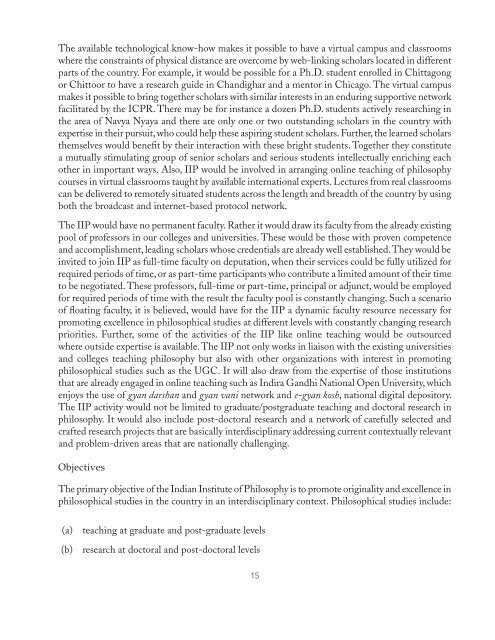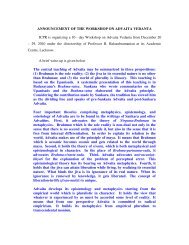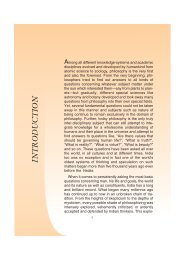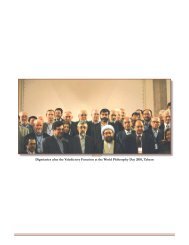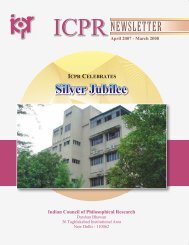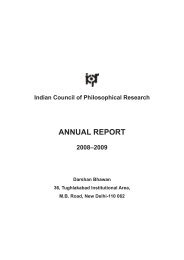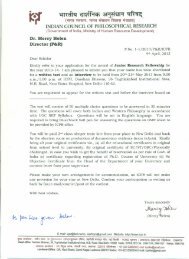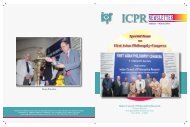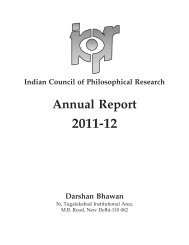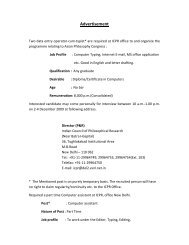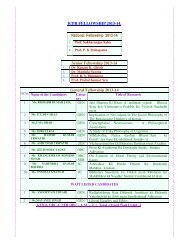(2010- 2011) English - Indian Council of Philosophical Research
(2010- 2011) English - Indian Council of Philosophical Research
(2010- 2011) English - Indian Council of Philosophical Research
You also want an ePaper? Increase the reach of your titles
YUMPU automatically turns print PDFs into web optimized ePapers that Google loves.
The available technological know-how makes it possible to have a virtual campus and classrooms<br />
where the constraints <strong>of</strong> physical distance are overcome by web-linking scholars located in different<br />
parts <strong>of</strong> the country. For example, it would be possible for a Ph.D. student enrolled in Chittagong<br />
or Chittoor to have a research guide in Chandighar and a mentor in Chicago. The virtual campus<br />
makes it possible to bring together scholars with similar interests in an enduring supportive network<br />
facilitated by the ICPR. There may be for instance a dozen Ph.D. students actively researching in<br />
the area <strong>of</strong> Navya Nyaya and there are only one or two outstanding scholars in the country with<br />
expertise in their pursuit, who could help these aspiring student scholars. Further, the learned scholars<br />
themselves would benefit by their interaction with these bright students. Together they constitute<br />
a mutually stimulating group <strong>of</strong> senior scholars and serious students intellectually enriching each<br />
other in important ways. Also, IIP would be involved in arranging online teaching <strong>of</strong> philosophy<br />
courses in virtual classrooms taught by available international experts. Lectures from real classrooms<br />
can be delivered to remotely situated students across the length and breadth <strong>of</strong> the country by using<br />
both the broadcast and internet-based protocol network.<br />
The IIP would have no permanent faculty. Rather it would draw its faculty from the already existing<br />
pool <strong>of</strong> pr<strong>of</strong>essors in our colleges and universities. These would be those with proven competence<br />
and accomplishment, leading scholars whose credentials are already well established. They would be<br />
invited to join IIP as full-time faculty on deputation, when their services could be fully utilized for<br />
required periods <strong>of</strong> time, or as part-time participants who contribute a limited amount <strong>of</strong> their time<br />
to be negotiated. These pr<strong>of</strong>essors, full-time or part-time, principal or adjunct, would be employed<br />
for required periods <strong>of</strong> time with the result the faculty pool is constantly changing. Such a scenario<br />
<strong>of</strong> floating faculty, it is believed, would have for the IIP a dynamic faculty resource necessary for<br />
promoting excellence in philosophical studies at different levels with constantly changing research<br />
priorities. Further, some <strong>of</strong> the activities <strong>of</strong> the IIP like online teaching would be outsourced<br />
where outside expertise is available. The IIP not only works in liaison with the existing universities<br />
and colleges teaching philosophy but also with other organizations with interest in promoting<br />
philosophical studies such as the UGC. It will also draw from the expertise <strong>of</strong> those institutions<br />
that are already engaged in online teaching such as Indira Gandhi National Open University, which<br />
enjoys the use <strong>of</strong> gyan darshan and gyan vani network and e-gyan kosh, national digital depository.<br />
The IIP activity would not be limited to graduate/postgraduate teaching and doctoral research in<br />
philosophy. It would also include post-doctoral research and a network <strong>of</strong> carefully selected and<br />
crafted research projects that are basically interdisciplinary addressing current contextually relevant<br />
and problem-driven areas that are nationally challenging.<br />
Objectives<br />
The primary objective <strong>of</strong> the <strong>Indian</strong> Institute <strong>of</strong> Philosophy is to promote originality and excellence in<br />
philosophical studies in the country in an interdisciplinary context. <strong>Philosophical</strong> studies include:<br />
(a) teaching at graduate and post-graduate levels<br />
(b) research at doctoral and post-doctoral levels<br />
15


